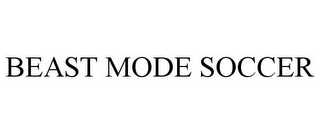
David Copeland-Smith filed a trademark application on BEAST MODE SOCCER for T-shirts, which the USPTO refused based on two registered marks for BEAST MODE owned by retired NFL football player Marshawn Lynch. The registered marks covered the goods of “Men’s, women’s and children’s clothing, namely, shirts, sweatshirts; [and] headwear, namely hats, caps.”
Copeland-Smith argued the BEAST MODE mark was weak due to third party trademark registrations, applications, and uses of Beast Mode. The appeals court disagreed.
The seven third party registrations did not identify articles of closing, but rather pertained to ““computer software, dietary and nutritional supplements, beer, advertising and marketing consultancy, and entertainment in the nature of competitions in the field of fitness…” In other words, the goods/services of the third party registrations were not close enough to clothing to narrow Lynch’s rights in BEAST MODE.
Regarding uses, the Foreign websites identified by Copeland-Smith where of no probative value in determining likelihood of confusion in the US.
Further, many of the US websites with uses of Beast Mode were directed to goods and services other than clothing. The appeals court noted its prior decision where it said “T]he present analysis only involves goods like those being offered by the parties to the ‘relevant public,’ while third-party use outside of that relevant market is meaningless.”
Therefore, third party use of marks should be in connection with goods/services like those offered by the parties to have a good chance a narrowing trademark rights.
Case: In Re: Copeland-Smith, No. 2018-1968 (Fed. Cir. 2019)
One Reply to “Third Party Use Not Close Enough to Goods of Registrant to Sufficiently Weaken Rights”
Comments are closed.